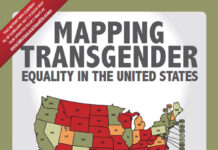Steven Alix was in the midst of opening his newest bar on Denver’s Colfax Avenue when he had something of an existential crisis.
It was early 2021 and as the owner of two other establishments, X Bar and and The Squire Lounge, Alix had just been through the now all-too-familiar ringer of COVID-induced closures and social distancing requirements that necessitated repeatedly retooling his businesses. He had long dreamed of opening a sports bar where LGBTQ fans could feel “absolutely comfortable” celebrating their favorite local teams, but reality was setting in.

Kathryn Scott, Special to The Denver Post
Todd Brown, left, Aaron Scoresby, and Seth Koonce, right, join other patrons at the newly-opened Tight End, Denver’s first gay sports bar on April 24, 2021 in Denver. The bar has an outdoor patio, nine televisions, and a full beer and cocktail menu.
“Here I was opening a bar when COVID wasn’t over and neither were the restrictions,” Alix said. “I was just so excited about the project that I got into and had this aha moment like, ‘Oh my God, what am I doing?’ ”
Alix persevered, and in April 2021 opened the city’s first gay sports bar, Tight End, one in a wave of new, LGBTQ-focused establishments and events to come on the scene since the pandemic began. Owners and organizers said the increase in the number of queer spaces recently seems more coincidental than anything, but also acknowledged that now, more than ever, there’s a need for them.
“The pandemic really made people prioritize what was important for them,” said tara jae, founder/executive director of the nonprofit Youth Seen and co-founder of Black Pride. “It was no longer about going along with the status quo, right? It was very much about, ‘I needed to put self, I need to put my wellness first,’ and however that looks.”
In the case of Black Pride, which hosted its inaugural celebration in 2021, that means encouraging Black Denverites to “take up space” and claim Pride Month in a way that is uniquely their own, said jae. This year’s festivities run from June 15 to 25 and include events such as an evening discussion with young adult author Nic Stone (June 16), a fundraising gala at the Denver Botanic Gardens (June 17), a drag show at X Bar featuring Black performers (June 18), and a Juneteenth family cookout at Tracks (June 19). (See the full lineup here.)
“Since 2017, I’ve been strongly advocating for specific services for Black queer, trans and nonbinary folks. I am not taking away from the LGBTQ community as a whole. I am just asking for more focus to be put on our Black community,” jae said. “We have Juneteenth, which was the liberation of Black people, and Black Pride just extends that and opens it up to talking about celebrating our joy and our healing.”
One thing Alix at Tight End attributes to the rise in LGBTQ bars is that there’s room for them, even in the unofficial “gayborhood” on Colfax where his businesses reside. There were dozens when he moved to Denver in 2005, Alix recalled, but that number has dwindled over time.
“At one point, we were down to 10 or 11, so there’s definitely room for more bars,” he said. “I expect that people maybe have had ideas for a long time and were afraid to do it, and now they’re doing it. Which is brave because there are a lot of things happening, including high rent.”

Helen H. Richardson, The Denver Post
Trystan Lawhon, (they/them), left, works out during a non-binary, trans-masculine class at Metamorphosis Fitness on June 7, 2022 in Denver.
For sober members of the LGBTQ community, there are even fewer places where they can find refuge, said Styler Ells, owner of Metamorphosis Fitness in University Hills. Ells, who uses they/them pronouns, opened the gym in 2017 and intentionally designed it with inclusivity in mind.
Class instructors ask for members’ pronouns prior to a workout, the bathrooms are built to be genderless and the gym does not have mirrors on the workout floor or in studios. (Members of the LGBTQ community disproportionately struggle with body dysmorphia, Ells said.) But it wasn’t until the pandemic that the gym proverbially came out as a queer space.
In 2020, when Gov. Jared Polis closed gyms indefinitely to curb COVID-19, Ells paused memberships because they couldn’t in good faith charge clientele for a service they weren’t able to use — a devastating blow considering the business was already struggling financially.
“Every single person at the gym, with exception of one member, messaged me back and asked me to please continue to bill them because they were worried the gym would fold and they would lose their safe space,” Ells said. “I had the startings of growing a queer space, I had the startings of being very body positive and body accepting. But we hadn’t been out loud and proud about it.
“To know that we had a membership that valued what we were building enough to literally pay for memberships that they weren’t even using for three months just to keep our gym afloat, that was transformative for me. That was the moment when I was like, we can’t hide anymore,” they said.
In late 2020, Metamorphosis Fitness rebranded — “went full-born queer as possible,” Ells said — and by early 2021 membership had tripled. About 85% of its members identify as part of the LGBTQ community, while 15% represent allies, they said.
Ells saw the gym was not only filling a local need, but also exposing an unfulfilled one nationwide. After one of Ells’ videos about the gym went viral on TikTok, requests for a similar concept poured in from across the country and abroad.
While an expansion isn’t in the cards right now, Ells said, the response prompted them to develop a certification program that other gyms can adopt to be more inclusive. The certification will help gyms reimagine their physical space, educate their staff and reevaluate their programming to be queer-friendly and queer-affirming. Ells hopes to launch the program with a pilot group of Colorado gyms in early 2023.
While all of these concepts were born out of the pandemic, debuting is hardly the last challenge they’ll face. Alix said he got lucky that Major League Baseball’s All-Star Game came to Denver shortly after Tight End opened, encouraging the government to loosen restrictions and helping boost business. The response has since been very positive, he added.
And jae said Youth Seen’s main focus is providing mental health and wellness services for LGBTQ and BIPOC individuals, offering support for folks looking for housing and medical services, and organizing youth programs that aim to inspire and empower — all of which is not limited to Pride Month.
“It’s super important to help maintain these organizations, specifically Black queer organizations, because we struggle year-round,” jae said. “Pride is just one month and the acknowledgment is great and we’re totally taking it because we love it, but what does it mean to support and help us sustain year-round?”























